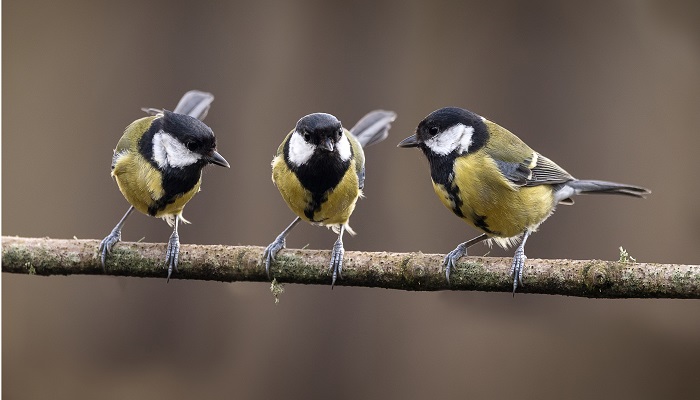Study conducted by University of Oxford says More social birds are more adventurous feeders
In nature, feeding in groups has various advantages – such as for spotting predators and finding the best places to eat – but hanging around with others also comes with the drawback of increased competition for food resources. One way that sociable individuals could reduce competition is by broadening their diets to include new types of food. For the first time, researchers have now demonstrated a direct link between individual birds’ position within their ‘social network’ and their likelihood to exploit novel food sources.
The study, carried out in Wytham Woods, Oxfordshire, assessed the behaviour of 105 wild great tits while they foraged in flocks during the winter. By fitting the birds with radio frequency identification (RFID) tags, the researchers were able to precisely monitor each individual’s behaviour at feeders as well as tracking each bird’s ‘social network position’ in relation to how many social associates they held and who they preferred to spend time with.
After closely monitoring the birds to establish their social network, the researchers then tested each birds’ propensity to use novel foods. At one of the feeding stations, the birds were offered a choice between a feeder containing a familiar food (ground peanuts) and one containing a novel looking food (ground peanuts dyed red or green). Over 19 days, the researchers tracked how often the birds used the new food source over the familiar food, then analysed whether this was linked to a range of different factors.
The results showed that individual bird’s tendency to use the novel food source over familiar food was significantly predicted by their social network position. Individuals with more social associations to other birds within the networks consumed significantly greater proportions of the novel food, with the most sociable birds eating twice the proportion of the novel food relative to the less sociable individuals. No other characteristics – such as age, sex, flock size, or total feeding rates- were found to be linked to individual preference for novel food.
Curiously, sociability had no impact on how quickly birds first used the novel feeder, with most birds (92%) using the novel food at some point during the trial, and no difference between sociable birds and less sociable birds in how quickly they tried it.
Lead researcher Dr Keith McMahon (Department of Biology, University of Oxford) said: ‘This indicates that the increased usage of the novel food by the more social birds was not due to them being generally more exploratory or brave, but rather that more social birds are more likely to use novel food as a way of expanding their diets to offset the costs of having more foraging associates.’
The researchers suggest that future work could examine how more social individuals may receive additional information about new food sources transmitted through their group members, increasing their confidence in using these novel options.
Senior researcher Dr Josh Firth (Department of Biology, University of Oxford) said: ‘The findings suggest that highly social birds may alleviate the costs of competition for food by foraging more broadly and exploiting novel food sources, but future research could explore whether there are additional reasons which explain why more social individuals are more likely to tolerate new foods.’
About the University of Oxford
Oxford University has been placed number 1 in the Times Higher Education World University Rankings for the eighth year running, and number 3 in the QS World Rankings 2024. At the heart of this success are the twin-pillars of the ground-breaking research and innovation and distinctive educational offer.
Oxford is world-famous for research and teaching excellence and home to some of the most talented people from across the globe. Oxford University’s work helps the lives of millions, solving real-world problems through a huge network of partnerships and collaborations. The breadth and interdisciplinary nature of our research alongside the personalised approach to teaching sparks imaginative and inventive insights and solutions.
Through its research commercialisation arm, Oxford University Innovation, Oxford is the highest university patent filer in the UK and is ranked first in the UK for university spinouts, having created more than 300 new companies since 1988. Over a third of these companies have been created in the past five years. The university is a catalyst for prosperity in Oxfordshire and the United Kingdom, contributing £15.7 billion to the UK economy in 2018/19, and supports more than 28,000 full time jobs.
The Department of Biology is a University of Oxford department within the Maths, Physical, and Life Sciences Division. It utilises academic strength in a broad range of bioscience disciplines to tackle global challenges such as food security, biodiversity loss, climate change and global pandemics. It also helps to train and equip the biologists of the future through holistic undergraduate and graduate courses.
Source: University of Oxford


